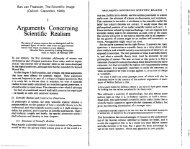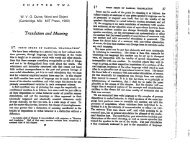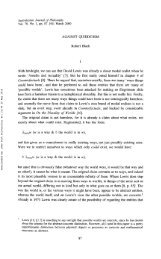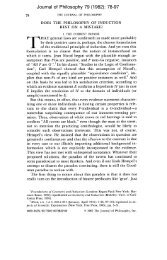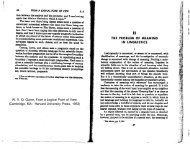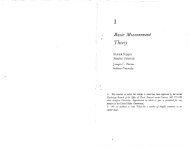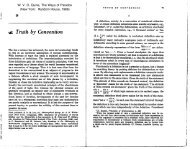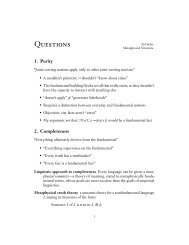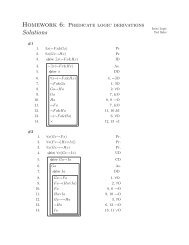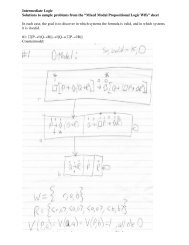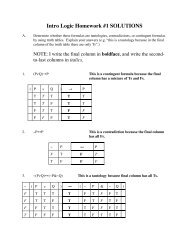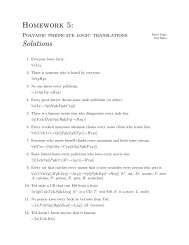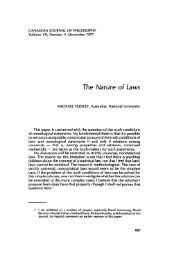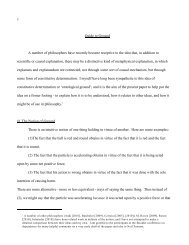Dummett - Wittgenstein's Philosophy of Mathematics.pdf - Ted Sider
Dummett - Wittgenstein's Philosophy of Mathematics.pdf - Ted Sider
Dummett - Wittgenstein's Philosophy of Mathematics.pdf - Ted Sider
You also want an ePaper? Increase the reach of your titles
YUMPU automatically turns print PDFs into web optimized ePapers that Google loves.
MICHAEL D UMMETT<br />
seven girls there are twelve children. If he accepts these argu-<br />
ments it will be quite true that he will have adopted a new<br />
criterion for saying that there are twelve children present, and<br />
again a new criterion for saying, "I must have miscounted."<br />
Before, he would say, "I miscounted," only when he noticed<br />
that he had, for example, counted one <strong>of</strong> the children twice over;<br />
now he will say, "I miscounted," when he has not observed<br />
anything <strong>of</strong> this kind, simply on the ground that he got the result<br />
that there were five boys, seven girls, and thirteen children.<br />
But we wish to say that even before we met this person and<br />
taught him the principles <strong>of</strong> addition, it would have been true<br />
that if he had counted five boys, seven girls, and thirteen<br />
children, he would have been wrong even according to the<br />
criteria he himself then acknowledged. That is, he must have<br />
made a mistake in counting; and if he made a mistake, then<br />
there must have been something that he did which, if he had<br />
noticed it, he himself would then have allowed as showing that<br />
he had miscounted.<br />
If we say that if he counted five boys, seven girls, and thirteen<br />
children, then there must have been something which, if he had<br />
noticed it, he would have regarded as a criterion for having<br />
miscounted, then the effect <strong>of</strong> introducing him to the concept <strong>of</strong><br />
addition is not to be simply described as persuading him to adopt<br />
a new criterion for having miscounted; rather, he has been<br />
induced to recognize getting additively discordant results as a<br />
symptom <strong>of</strong> the presence <strong>of</strong> something he already accepted as a<br />
criterion for having miscounted. That is, learning about addition<br />
leads him to say, "I miscounted," in circumstances where he<br />
would not before have said it; but if, before he had learned,<br />
he had said, "I miscounted," in those circumstances, he would<br />
have been right by the criteria he then possessed. Hence the<br />
necessity for his having miscounted when he gets additively<br />
discordant results does not, as it were, get its whole being from<br />
his now recognizing such results as a criterion for having mis-<br />
counted.<br />
If on the other hand we say that it is possible to count five<br />
boys, seven girls, and thirteen children without there being<br />
anything other than the fact <strong>of</strong> getting these results such that,<br />
334



